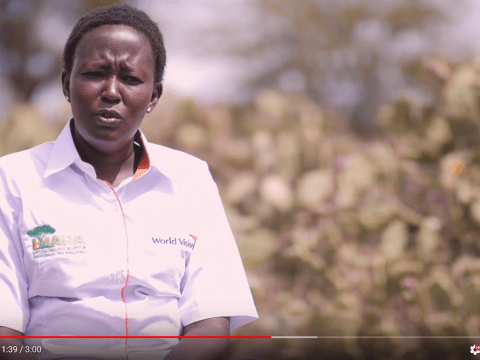Integrated Management of Natural Resources for Resilience in Arid and Semi-Arid Lands (IMARA)
IMARA seeks to revitalise and preserve rangeland assets for the benefit of the current and future generations through diversified livelihoods and improved natural resource management and use in Kenya's Arid and Semi-Arid Lands (ASALs).
Funding: Government of Sweden, World Vision Australia (Match Fund).
Partners: World Vision Kenya (WVK- Lead), Northern Rangelands Trust (NRT), Maasai Mara Wildlife Conservancies Association (MMWCA), Saferworld, and Stockholm Environment Institute (SEI).
Other Supporting Partners: Pokot Youth Bunge, Turkana Pastoralists Development Organization (TUPADO) and Indigenous Livelihood Enhancement Partners (ILEPA).
Focal Reach in Kenya:
- Turkana County: Katilu, Kaptir and Lobokat Wards
- West Pokot County: Riwo, Kodich, and Suam
- Elgeyo Marakwet: Emsoo, Endo, Embobut and Sambirir Wards
- Narok County: Suswa, Mara, Siana, Maji Moto, Naikarra, Kimintet and Lolgorian Wards
- Isiolo County: Oldonyiro, Nasuula, Nakuprat-Gotu, Biligo and Bulesa
- Samburu County: Suguta, Amaiya, Maralal, Lodo Kejek, Baawa, Kalama, Sera, Waso West, Wamba East and Wamba North
- Marsabit County: Loglogo, Laisamis and Selected locations in Korr/Ngurnet Wards
- Laikipia County: Mukogodo East and West Wards
Duration: 7 Years (July 2018 – October 2025)
Budget: Government of Sweden (SEK 229.5 Million) and World Vision Australia (USD 1,316,022)
Programme Objective: Integrated Management of Natural Resources for resilience in the ASALs (IMARA), is a seven-year partnership programme (2018-2025) that seeks to increase resilience of vulnerable households to climate-change-related shocks through diversified livelihoods and improved natural resource management and use in the ASAL counties of Elgeyo Marakwet, Isiolo, Laikipia, Marsabit, Narok, Samburu, Turkana and West Pokot.
Programme Outcomes:
1. Secure livelihoods and strengthened inclusive market systems that support sustainable natural resources management.
- Opportunities for diversified livelihoods created and/or expanded from natural resources management
- Improved markets and market linkages for sustainable Natural Resource Based products
- Improved markets, market linkages, and innovations for sustainable Natural Resource Based products
- Increased access to suitable financial products and services for targeted communities, including youth, women and other value chain actors
- Improved private sector investments.
2. Sustainable and restored social-ecological landscapes for enhanced biodiversity and ecosystems services
- Enhanced management of rangelands, forests and critical wildlife areas
- Enhanced integrated water resources management
- Improved capacity for climate and disaster resilience
- Increased access to modern /efficient and sustainable renewable energy options
- Climate change adaptation and mitigation measures adopted
3. Strengthened governance systems and structures for conflict sensitive and sustainable natural resources management and climate change adaptation at community, county and national levels
- Enhanced social accountability processes and structures on natural resources management at the local level
- Strengthened engagement on review, development and implementation of natural resources management policies and climate change adaptation, legislations and strategies
- Functional, inclusive, responsive and effective formal and alternative dispute resolution (ADR) mechanisms for managing resource based conflicts within and neighbouring target counties.
4. Programme monitoring, evaluation, accountability, learning and research effectively co-ordinated
- Effective project monitoring and evaluation undertaken
- Programme accountability, learning and knowledge management mechanisms put in place
- Research on thematic programme areas undertaken
Key Strategies:
- Gender & Social Inclusion (GESI): Involvement of women and youth in programme interventions.
- Bottom Up Approach: Working with local structures and building on existing systems, structures and programmes with a view to strengthening them and enhance their capacity to deliver their intended impacts.
- Capacity Building: Enhancing community knowledge, skills, attitudes, and practices necessary to drive and sustain the initiatives supported.
- Leveraging local partners’ diverse capacities: IMARA recognises the value of tapping into existing capacities beyond the consortium partners. As such, it will endeavour to partner with commercial/private actors within the target locations.
- Market Systems Development Approach: Building the capacity of local market actors, fostering trust-based relationships between actors, and aligning their incentives to unlock new market opportunities.
- Community based Natural Resource Management: Once supported and given the opportunity, communities are better placed to conserve natural resources.
- Right Based Approach: Entrenching the culture of public participation and social accountability at all levels for sustainable natural resource management.
- Conflict Sensitivity in Programming: Peaceful co-existence among communities is a key enabler for sustainable natural resource management. The IMARA programme will promote positive conflict resolution and do-no-harm/local capacities for peace principles in all its interventions.
- Local Value Chain Development: Mapping and analysis of value chains to determine the opportunities, barriers and critical actors in the various stages, in order to identify the required interventions.
- Research and learning: Systematic research and documentation will be enhanced as part of knowledge management as well as promoting adaptive programme management.
